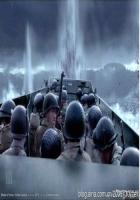I made my way down to the water-side, where Jake Landrasse sat alone on the gunwale of a Kentucky boat, smoking a clay pipe as he fished.I had to exercise persuasion to induce Jake to paddle me across, which he finally agreed to do on the score of old friendship, and he declared that the only reason he was not at the barbecue was because he was waiting to take a few gentlemen to see General Clark.I agreed to pay the damages if he were late in returning for these gentlemen, and soon he was shooting me with pulsing strokes across the lake-like expanse towards the landing at Fort Finney.Louisville and the fort were just above the head of the Falls, and the little town of Clarksville, which Clark had founded, at the foot of them.I landed, took the road that led parallel with the river through the tender green of the woods, and as I walked the mighty song which the Falls had sung for ages to the Wilderness rose higher and higher, and the faint spray seemed to be wafted through the forest and to hang in the air like the odor of a summer rain.
It was May-day.The sweet, caressing note of the thrush mingled with the music of the water, the dogwood and the wild plum were in festal array; but my heart was heavy with thinking of a great man who had cheapened himself.At length I came out upon a clearing where fifteen log houses marked the grant of the Federal government to Clark's regiment.Perched on a tree-dotted knoll above the last spasm of the waters in their two-mile race for peace, was a two-storied log house with a little, square porch in front of the door.As I rounded the corner of the house and came in sight of the porch I halted --by no will of my own--at the sight of a figure sunken in a wooden chair.It was that of my old Colonel.His hands were folded in front of him, his eyes were fixed but dimly on the forests of the Kentucky shore across the water; his hair, uncared for, fell on the shoulders of his faded blue coat, and the stained buff waistcoat was unbuttoned.For he still wore unconsciously the colors of the army of the American Republic.
``General!'' I said.
He started, got to his feet, and stared at me.
``Oh, it's--it's Davy,'' he said.``I--I was expecting --some friends--Davy.What--what's the matter, Davy?''
``I have been away.I am glad to see you again, General.
``Citizen General, sir, Major-general in the army of the French Republic and Commander-in-chief of the French Revolutionary Legion on the Mississippi.''
``You will always be Colonel Clark to me, sir,'' Ianswered.
``You--you were the drummer boy, I remember, and strutted in front of the regiment as if you were the colonel.
Egad, I remember how you fooled the Kaskaskians when you told them we were going away.'' He looked at me, but his eyes were still fixed on the point beyond.``You were always older than I, Davy.Are you married?''
In spite of myself, I laughed as I answered this question.
``You are as canny as ever,'' he said, putting his hand on my shoulder.``Liberty, Equality, Fraternity,--they are only possible for the bachelor.'' Hearing a noise, he glanced nervously in the direction of the woods, only to perceive his negro carrying a pail of water.``I--I was expecting some friends,'' he said.``Sit down, Davy.''
``I hope I am not intruding, General,'' I said, not daring to look at him.
``No, no, my son,'' he answered, ``you are always welcome.Did we not campaign together? Did we not--shoot these very falls together on our way to Kaskaskia?''
He had to raise his voice above the roar of the water.
``Faith, well I remember the day.And you saved it, Davy,--you, a little gamecock, a little worldly-wise hop-o'-my-thumb, eh? Hamilton's scalp hanging by a lock, egad--and they frightened out of their five wits because it was growing dark.'' He laughed, and suddenly became solemn again.``There comes a time in every man's life when it grows dark, Davy, and then the cowards are afraid.They have no friends whose hands they can reach out and feel.But you are my friend.You remember that you said you would always be my friend? It--it was in the fort at Vincennes.''
``I remember, General.''
He rose from the steps, buttoned his waistcoat, and straightened himself with an effort.He looked at me impressively.
``You have been a good friend indeed, Davy, a faithful friend,'' he said.``You came to me when I was sick, you lent me money,''--he waved aside my protest.``I am happy to say that I shall soon be in a position to repay you, to reward you.My evil days are over, and I spurn that government which spurned me, for the honor and glory of which I founded that city,''--he pointed in the direction of Louisville,--``for the power and wealth of which I conquered this Northwest territory.Listen! Iam now in the service of a republic where the people have rights, I am Commander-in-chief of the French Revolutionary Legion on the Mississippi.Despite the supineness of Washington, the American nation will soon be at war with Spain.But my friends--and thank God they are many--will follow me--they will follow me to Natchez and New Orleans,--ay, even to Santa Fe and Mexico if I give the word.The West is with me, and for the West I shall win the freedom of the Mississippi.For France and Liberty I shall win back again Louisiana, and then Ishall be a Marechal de Camp.''
I could not help thinking of a man who had not been wont to speak of his intentions, who had kept his counsel for a year before Kaskaskia.
``I need my drummer boy, Davy,'' he said, his face lighting up, ``but he will not be a drummer boy now.He will be a trusted officer of high rank, mind you.Come,''
he cried, seizing me by the arm, ``I will write the commission this instant.But hold! you read French,--Iremember the day Father Gibault gave you your first lesson.'' He fumbled in his pocket, drew out a letter, and handed it to me.``This is from Citizen Michaux, the famous naturalist, the political agent of the French Republic.Read what he has written me.''
I read, I fear in a faltering voice:--
``Citoyen General:















